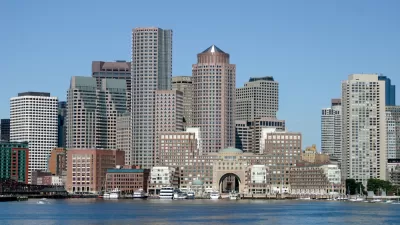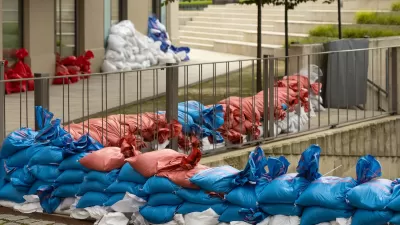Hurricane Sandy served as a wake up call for many cities to the dangers of rising seas and more extreme storms. To prepare for these threats, officials in Boston have proposed zoning rules that would require developers to detail mitigation measures.
"City officials proposed new zoning rules Tuesday that would require developers of large new buildings in Boston to submit plans to deal with flooding, heat waves, and other potential complications of climate change as sea levels and temperatures are projected to rise," reports David Abel.
“Climate change is rapidly and drastically altering the world in which we live, and Boston, like many other coastal cities, will suffer if we don’t take action,” Brian Swett, the city’s chief of environment and energy, said at a press conference announcing the rules. “We cannot and will not kick the can down the road for someone else to deal with, because this issue is not generations away; it’s right on our doorstep.”
"Swett said the proposed rules would require developers to fill out a lengthy checklist about their building’s ability to withstand floods, cope with power outages, and conserve energy, among other things," notes Abel. "But he said the city has no plans to institute blanket regulations about where a developer might house electrical systems or what kind of materials they use."
FULL STORY: New city zoning plans tied to changes in climate

Study: Maui’s Plan to Convert Vacation Rentals to Long-Term Housing Could Cause Nearly $1 Billion Economic Loss
The plan would reduce visitor accommodation by 25,% resulting in 1,900 jobs lost.

North Texas Transit Leaders Tout Benefits of TOD for Growing Region
At a summit focused on transit-oriented development, policymakers discussed how North Texas’ expanded light rail system can serve as a tool for economic growth.

Why Should We Subsidize Public Transportation?
Many public transit agencies face financial stress due to rising costs, declining fare revenue, and declining subsidies. Transit advocates must provide a strong business case for increasing public transit funding.

How to Make US Trains Faster
Changes to boarding platforms and a switch to electric trains could improve U.S. passenger rail service without the added cost of high-speed rail.

Columbia’s Revitalized ‘Loop’ Is a Hub for Local Entrepreneurs
A focus on small businesses is helping a commercial corridor in Columbia, Missouri thrive.

Invasive Insect Threatens Minnesota’s Ash Forests
The Emerald Ash Borer is a rapidly spreading invasive pest threatening Minnesota’s ash trees, and homeowners are encouraged to plant diverse replacement species, avoid moving ash firewood, and monitor for signs of infestation.
Urban Design for Planners 1: Software Tools
This six-course series explores essential urban design concepts using open source software and equips planners with the tools they need to participate fully in the urban design process.
Planning for Universal Design
Learn the tools for implementing Universal Design in planning regulations.
Ascent Environmental
Borough of Carlisle
Institute for Housing and Urban Development Studies (IHS)
City of Grandview
Harvard GSD Executive Education
Toledo-Lucas County Plan Commissions
Salt Lake City
NYU Wagner Graduate School of Public Service





























